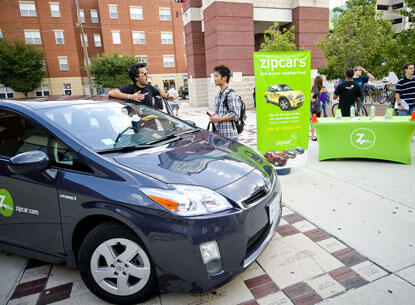
Aug. 27, 2010
A New 'environment' for Learning: Climate Action Plan, American College and University Presidents’ Climate Commitment create the framework for a greener VCU
Carpool program, zipcars unveiled for the fall semester
Share this story
Virginia Commonwealth University became a greener place for learning over the summer.
As the fall semester begins, some of the most noticeable changes are taking place in transportation. Faculty and staff can now share rides to work, and students and other members of the campus community don’t have to own a car in order to run errands or take a trip to the mall.
In addition, mobility hubs are being established on both the Monroe Park and MCV campuses for buses, zipcars, bicycle racks and power stations for Segways. VCU also is continuing to provide students with free GRTC bus passes.
In non-transportation sustainability efforts, VCU is installing solar panels and photovoltaic systems at several locations across the university. They will provide one-third of the new student housing hot water needs and 75 percent of Shafer Dining Center's. The solar photovoltaic systems will provide power for the parking deck lights and charging stations for electric cars. Any excess power generated will go back on the grid and Dominion will pay the university.
VCU’s Sustainability Committee, a cross-section of Virginia Commonwealth University faculty, staff, students and administrators from both campuses, worked to create the VCU Climate Action Plan, a blueprint for neutralizing the university’s greenhouse gas emissions by 2050. The 105-page plan was completed in May. The committee is now committed to making recommendations become reality.
In January, Rao signed the American College and University Presidents’ Climate Commitment, an initiative to reduce the global emission of greenhouse gases by 80 percent by mid-century to avert the worst effects of global warming. Former VCU President Eugene P. Trani also signed the commitment in April 2008.
“The administration has signaled its seriousness in tackling this issue by committing time and resources,” said Jacek Ghosh, VCU director of sustainability. “With the Climate Action Plan in place, the hard work begins with implementing the plan’s strategies and measuring its success.”
Rethinking how people travel to work and class is one of the ways VCU can reduce its “carbon footprint” or greenhouse gas emissions.
A new VCU CarPool program to encourage three or more faculty or staff members to ride together will reduce the number of single occupant vehicles commuting to campus, improve air quality and safety and reduce traffic congestion. Perks for participants include free parking, free emergency rides home through RideFinders and preferred parking assignments.
A new Zipcar car-sharing program is also in place, which makes it easier to avoid having a car at campus. Zipcar enables VCU students, faculty and staff who are 18 or older, and members of the surrounding community who are at least 21 to reserve cars as needed by the hour or the day. There are four cars available for rent, two on each campus.
VCU is also working to incorporate green designing practices into new and existing buildings, adding classes and programs on sustainability, incorporating new ideas for better storm water management such as rain gardens and bayscaping and increasing opportunities for recycling and composting.
Visit VCU Goes Green for more tips about conservation and more information about VCU’s sustainability efforts.
The new sustainability projects take place as VCU concludes the Year of the Environment, which highlights the contributions and leadership that universities can bring to further improve Virginia’s sustainable practices and the impact on natural resources.
Subscribe to VCU News
Subscribe to VCU News at newsletter.vcu.edu and receive a selection of stories, videos, photos, news clips and event listings in your inbox.










